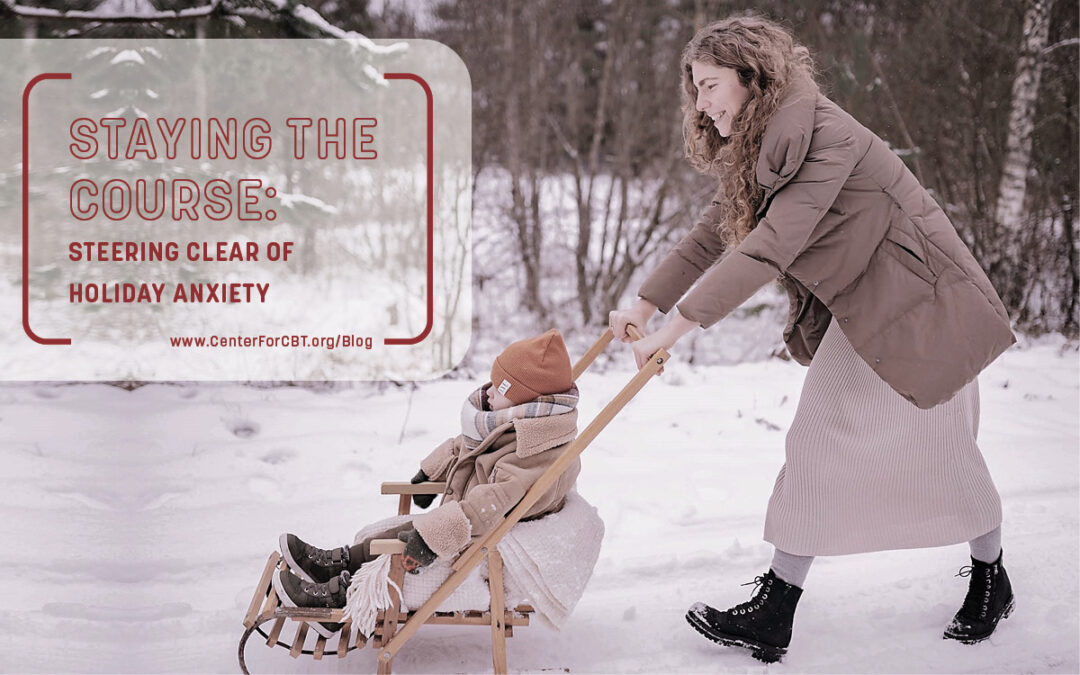As you read this article, your plans for the upcoming holidays are probably set. Maybe you are planning a short trip to see family and friends, a winter vacation, or just a few relaxing days around the house. Whatever your plans are, if you are a parent to a child with anxiety it is important to be thoughtful as you map out your itinerary. Holidays bring you and your child a lot to look forward to, and they also bring big changes to the daily routine. Holiday anxiety can make it difficult for them to adjust to the new schedule and situations that come with it.
Helping Your Child Manage their Anxiety
When it comes to managing your child’s holiday anxiety, it’s important to remember that communication is key. Maintain an open dialogue with your child about how they are feeling and check in with them regularly. These strategies can help you better prepare your child for the holiday season so that your family can make the most of the time together:
Stick to a Routine
Vacation from school is often seen as a time to be more relaxed about your child’s routines. After all, children work so hard during the school year. Shouldn’t they be able to just stay up late? Spend more time playing video games? Get a break from making their beds? Yes, but only to a degree. Most children thrive on consistency, especially the anxious ones. If you have rules about bedtime, wakeup, or video games during the school year, use similar ones on vacation (albeit with some pre-planned wiggle room).
Preview the Next Day
Fear of the unknown leads to feelings of uncertainty, which can increase anxiety. Take a few minutes each night to preview the next day’s activities with your child. If you are traveling, it can be helpful to look at brochures or guidebooks so your child can visualize where they will be.
Think Exposure
While many anxious children prefer not to think about school during vacation, it is important that they do. If your child’s anxiety relates to schoolwork, try to do some. Even if you are not doing worksheets, have your child spend time reading each day, or make a trip to the local library. It can be good for children to rest their brains, but for children who fear sitting down to study, avoiding it for several days will only lead to a setback when they have to start back up again. If your child is anxious in social situations, try to plan play dates with peers from their class, or go to the school playground.
Anticipate Challenges
If there is a potentially anxiety-provoking situation coming up (i.e. houseguests, parties, travel) do not just assume it will work itself out. Make sure your child is aware of the challenge, and set aside time to discuss it together. This will give you time to work out a solution and practice anxiety management strategies.
Showing Your Support
The support you show to your child is most effective when you offer it from a place of stability. Holiday anxiety can quickly become overwhelming for everyone. Caring for an anxious child requires patience, a quality best maintained when you set aside time for your own wellbeing, too. As you enter the holiday season, remember these tips to help manage your own anxiety:
Be Realistic
Make sure that you are setting realistic expectations for how things will go. If you have a child who has been anxious at large gatherings in the past, do not expect them to run over to hug their relatives. Unrealistic expectations can set you up for frustration and disappointment when things do not go as planned.
Practice Acceptance
Accept that some things are out of your control. Someone may show up late for dinner, or the toy that you want to purchase for your child may be out of stock. Plans may change, and it’s important to allow yourself to let go.
Find Time for Yourself
Amidst the excitement of the holidays and the time spent with family, set aside some personal time to help you stay calm. Find a few minutes to take a walk around the block or grab coffee with a friend. A short break may give you a new perspective and help to maximize your effectiveness as a parent.
Preparing for the Back-to-School Transition
A hallmark symptom of anxiety is avoidance. With holiday anxiety, children may have reduced exposure to anxiety-inducing situations, and become hesitant to return to their regular routine. When anxious children avoid what they fear, they experience relief in the moment. However, when they need to face their fears in the future they could experience greater difficulty. For example, following a vacation from school, a child with separation anxiety may have a harder time than usual leaving mom or dad on the first day back. A child with social anxiety may become more fearful of interacting with the other school children.
Some anxiety is inevitable, and still manageable. As a rule, the farther you drift from the regular daily routine, the harder it will be to transition back to the school routine. By maintaining some elements of your child’s regular schedule using the strategies in this article, you can help your child feel prepared for when winter break does end.
The holidays can be a lot to manage between what you, your child, and other members of your family need. There may be moments, both during and outside of the holidays, when you and your child will feel anxious. The best way to address them is to plan ahead, and face the challenges head on before the anxiety takes hold. Remind yourself to be grateful for the things and people who you have in your life, and take time to enjoy the holiday!


